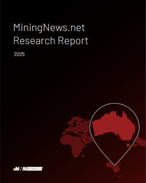Balama produced 35,000 tonnes of natural graphite for the period, down from 38,000t, while its C1 costs were up to US$709/t, compared to its average sales price of $716/t.
Sales eased to 28,000t due to the interruptions, but the company is optimistic of making up for lost time.
Managing director Shaun Verner described a disappointing December quarter as being down to "short-term challenges" that had been solved.
For the month of December, uninterrupted production averaged of 19,000t despite ore feed variability and processing instability in the ramp-up of operations.
Together with increased production and economies of scale, Syrah is hopeful of cash costs falling to $430-500/t if it can maintain 20,000tpm, and Verner said the company could increase production in response to market demand.
Port capacity at Nacala and Pemba has significantly improved and the company "could have sold and shipped more product without the interruptions".
Shipping rates have also normalised.
With Tesla in hand as an offtake partner for an additional 17,000tpa AAM from Vidalia, on top of its initial 8000tpa offtake agreement, and agreements with LG Energy Solution, Ford Motor Company and SK On being worked on, Syrah is finalising a definitive feasibility to support a further expansion to 45,000tpa.
At that level, it would still only use 25% of Balama's capacity.
The US Department of Energy, which has already provided a $102 million loan for Vidalia, is looking to offer a further $220 million to cover a significant proportion of the expansion.
Verner said Syrah hoped to take a final investment decision "in the coming months", but there was no hard deadline set.
Syrah claims to be the only vertically integrated, commercial scale AAM supply source outside China, and it is looking to replicate its experience in Louisiana in Europe, with a circa 40,000t joint venture being considered.
Verner told investors and analysts today because there is a "clear gap" between the rapid start-up times to produce batteries and electric vehicles and the long lead times to develop sources of raw resources, Syrah had a "significant incumbency advantage".
With production at a record 163,000tpa for 2022, despite having some kind of constraint "every single month", especially in its freight capacity, Verner said the market was "closer than ever" to market requiring Balama‘s full 350,000tpa capacity.
With its peers in the graphite and anode space far behind it, Verner said Syrah's future looks promising for decades given the rapid rise in graphite demand.
Syrah ended 2022 with $90 million cash, down from $103 million at the end of the September quarter as Vidalia spending ramped up.
Shares in Syrah eased 4% this morning to A$2.24, capitalising the company at $1.5 billion.
It has traded in a range of $1.11-2.69 over the past year.



